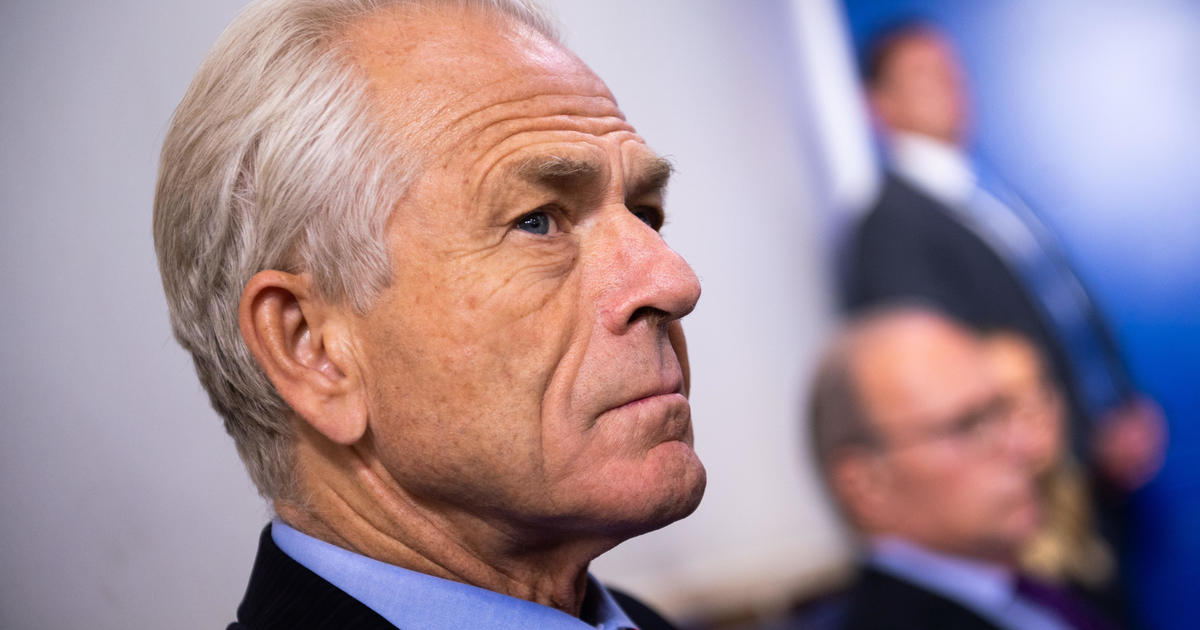/ CBS News
Navarro convicted of contempt of Congress
Washington — Peter Navarro, a former Trump White House official who oversaw much of the administration's trade policy, is set to be sentenced Thursday on two charges of contempt of Congress stemming from his refusal to comply with a subpoena related to his actions after the 2020 election.
In 2022, Navarro defied a subpoena for records and testimony from the now-defunct House select committee tasked with investigating the Jan. 6, 2021, attack on the U.S. Capitol. A federal jury in Washington, D.C., convicted Navarro after a short trial in September 2023.
U.S. District Judge Amit Mehta will hand down the sentence at a hearing in federal court in Washington at 10 a.m. on Thursday. Prosecutors have asked Mehta to impose a prison sentence of six months and a fine of $600,000.
The Navarro subpoena

In February 2022, congressional investigators were interested in Navarro's efforts to formulate a plan to delay the certification of the 2020 presidential election results from his post in the Trump White House. The Jan. 6 committee issued a subpoena seeking records and testimony, with its chairman saying Navarro "appears to have information directly relevant to the Select Committee's investigation."
Navarro refused to comply, claiming former President Donald Trump had asserted executive privilege over the material sought by the committee. President Biden and the White House Counsel's Office declined to invoke the privilege to shield Navarro from the congressional subpoena.
The House, controlled by Democrats, voted to hold him in contempt and referred the matter to the Justice Department for prosecution. The U.S. attorney in Washington then criminally charged him with two counts of contempt.
Prosecutors alleged during the one-day trial last year that Navarro "acted like he was above the law" when he did not comply with the committee's request. His attorneys unsuccessfully urged Mehta, the judge, to allow Navarro to argue that Trump instructed him to assert executive privilege and deny the congressional request.
In an evidentiary hearing on the executive privilege matter before trial, Navarro told Mehta it was "clear" Trump invoked the protection in a 2022 phone call. The judge, however, was unconvinced and barred that defense, saying there was no evidence that any official assertion was made. Navarro ultimately did not take the stand in his own defense.
Navarro's defense attorneys have indicated they will appeal the conviction based on Mehta's ruling. Any sentence the judge imposes on Thursday is likely to be delayed as the appeals process moves forward.
In their pre-sentencing memo, prosecutors told the court that Navarro "cloaked his bad-faith strategy of defiance and contempt behind baseless, unfounded invocations of executive privilege and immunity that could not and would never apply to his situation."
They alleged Navarro "chose allegiance to former President Donald Trump over the rule of law" when he opted not to show up for a scheduled deposition or hand over the documents requested by the Jan. 6 committee.
Navarro, they argued, did not communicate with committee staff "in any way" and should be held accountable for his unresponsiveness.
His defense team, however, argued the matter before the court was not that simple, claiming the case dealt with "novel issues of first impression." His attorneys urged Mehta to impose a period of six months of probation for each count and a $200 fine.
"Dr. Navarro acted because he reasonably believed he was duty-bound to assert executive privilege on former President Trump's behalf," Navarro's defense team wrote. They argued that Mehta himself had said in past court hearings that Navarro likely at least thought he was protected by privilege.
Navarro is the second Trump ally to be convicted for defying a subpoena from the Jan. 6 committee. Steve Bannon was found guilty in 2022 of the same two counts after he did not comply with a subpoena. He was sentenced to four months in prison, but a federal judge suspended the sentence to allow his appeal to move forward.
In court documents, Navarro's legal team worked to distinguish his case from Bannon's, arguing the congressional requests at issue in that case were mostly related to Bannon's work after he left the Trump White House, complicating any privilege claims.
But prosecutors said Bannon, unlike Navarro, "engaged" with the committee via an attorney and "at least suggested that under certain circumstances he might comply with the obligations of the subpoena he received."
Robert Legare is a CBS News multiplatform reporter and producer covering the Justice Department, federal courts and investigations. He was previously an associate producer for the "CBS Evening News with Norah O'Donnell."
Thanks for reading CBS NEWS.
Create your free account or log in
for more features.
